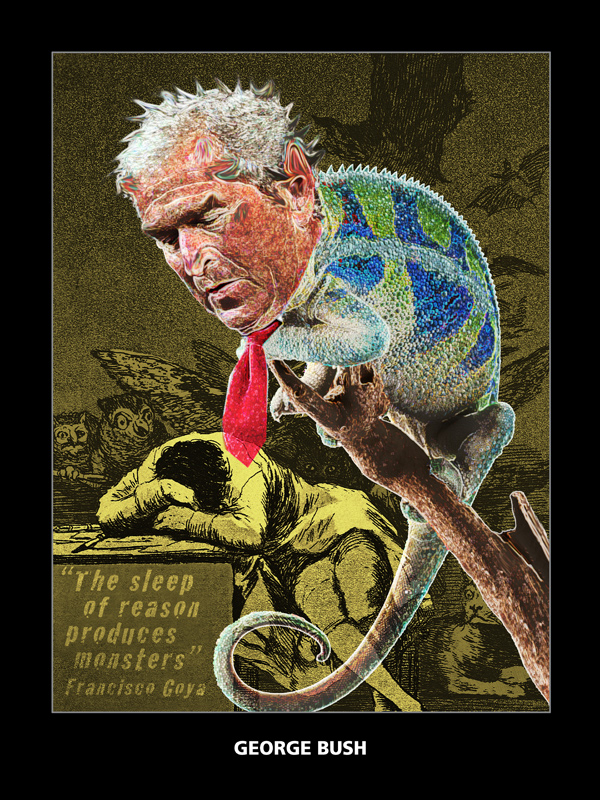
Summary
George Bush’s career began with an unsuccessful run for Congress in Texas in the late 1970s, after which he went into the oil business and later became co-owner of the Texas Rangers.
He served as governor of Texas, 1995-2000, signing into law a $2 billion tax cut, a bill which allowed for carrying concealed weapons, promoted faith-based organizations, and proclaimed June 10, 2000 as Jesus Day. He served as president of the U.S., 2001-2009.
Bush ran for president in 2000 as a compassionate conservative on a platform to increase the size of the armed forces and cut taxes. The close election was in effect decided by the Supreme Court.
Envisioning a $5.6 billion surplus in ten years, in early 2001 Bush called for some of the largest tax cuts in U.S. history. Because of these tax cuts, a discretionary defense budget which more than doubled, and increased domestic and foreign spending, the national debt grew from $5.6 to $11.3 trillion during his administration.
The longest post-World War II recession began in later 2007, marked by a subprime mortgage crisis, housing market drop, and increased oil prices. Bush signed a $170 billion economic stimulus package, the government took over Fannie Mae and Freddie Mac, and there was an $85 billion federal bailout of the American Insurance Group. Job loss in 2008 alone was over 2.6 million.
“I've abandoned free market principles to save the free market system,” he said in late 2008.
After September 11, 2001, Bush launched the War on Terror with wars in Afghanistan and Iraq. The Bush Administration proceeded to assert a right and intention to engage in “preventive war” in response to perceived threat, forming a basis for what became known as the Bush Doctrine. The war in Iraq was presented as necessary because of Iraq’s supposed weapons of mass destruction.
Over 4,400 U.S. troops were killed and over 31,900 wounded in Operation Iraqi Freedom as of early 2012. The financial cost of the war to the U.S. is over $845 billion. The war has not “virtually paid for itself through increased Iraqi oil exports,” as had been promised.
Bush said in 2006 to an Iowa crowd, “You know, when I campaigned here in 2000, I said, I want to be a war President. No President wants to be a war President, but I am one.”
Shortly before leaving office he remarked, “I think I was unprepared for war.”
Under Bush, the U.S. withdrew from the Kyoto Protocol on global warming and the Anti-Ballistic Missile Treaty with Russia.
The USA PATRIOT Act was passed, designed to reduce restrictions in law enforcement agencies’ gathering of intelligence within the United States and give greater discretion to law enforcement and immigration authorities in detaining and deporting immigrants suspected of terrorism-related acts.
Bush signed an executive order allowing federal funding for a few lines of stem cell research, but all of the lines were cultured in contact with mouse cells, creating safety issues that complicate development and approval of therapies. He later vetoed the Stem Cell Research Enhancement Act, which would have allowed federal money to be used for embryonic stem cell research.
No Child Left Behind legislation was passed during the Bush administration. It requires states to test all students at select grade levels in order to receive federal school funding. Critics argue that it is underfunded and its focus on testing and quantitative outcomes comes at the expense of time spent teaching.
Bush graduated from Yale and the Harvard Business School. He served in the Texas and Alabama Air National Guard from 1968-1974 and may have been treated favorably because of his father’s political status. He married in 1977 and has two daughters. His memoir is Decision Points.
Quotes
“If you've retired you don't have anything to worry about. It's the third time I've said that. I'll probably say it three more times. See, in my line of work you gotta keep repeating things over and over and over again for the truth to sink in, to kind of catapult the propaganda.”
(George W. Bush, May 24, 2005 – Audio)
Just several weeks after 9/11, amidst tragedy, horror, fear and an outrageous, growing national debt, President George W. Bush encouraged the nation to “Fly and enjoy America's great destination spots. Get down to Disney World in Florida. Take your families and enjoy life, the way we want it to be enjoyed.”
(Sources: White House Archives; CNN; Washington Post)
“I must say, I'm a little envious. If I were slightly younger and not employed here, I think it would be a fantastic experience to be on the front lines of helping this young democracy succeed. It must be exciting for you ... in some ways romantic, in some ways, you know, confronting danger. You're really making history, and thanks.”
(March 23, 2008, video conference call with U.S. military and civilian personnel – Source)
“If money isn't loosened up, this sucker could go down.”
(September 26, 2008, Summing up the risk to the global economy if Congressional leaders failed to approve Treasury Secretary Paulson's $700 billion financial bailout plan, at a bipartisan meeting hosted by the White House – Source)
“I know what I believe. I will continue to articulate what I believe and what I believe — I believe what I believe is right.”
(Rome, Italy, July 22, 2001, Source)
“I just want you to know that, when we talk about war, we're really talking about peace.”
(June 18, 2002, Dept. of Housing and Urban Development, Washington, D.C. – Source)


